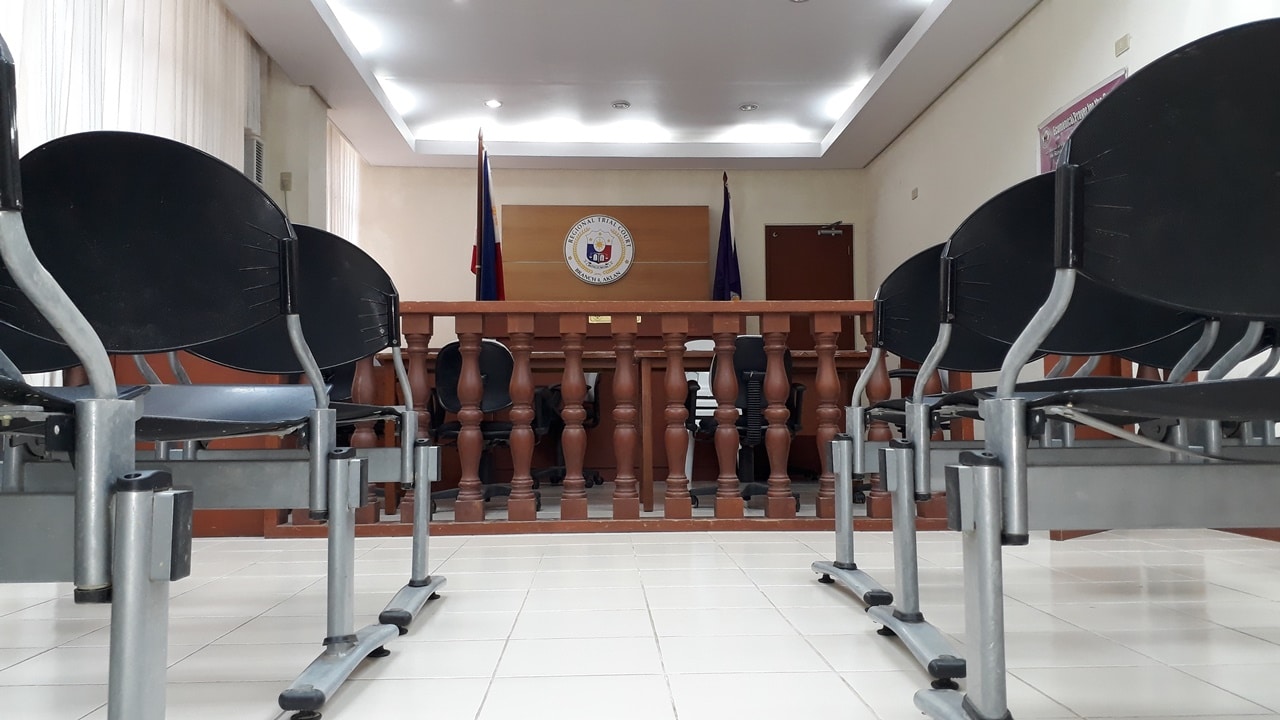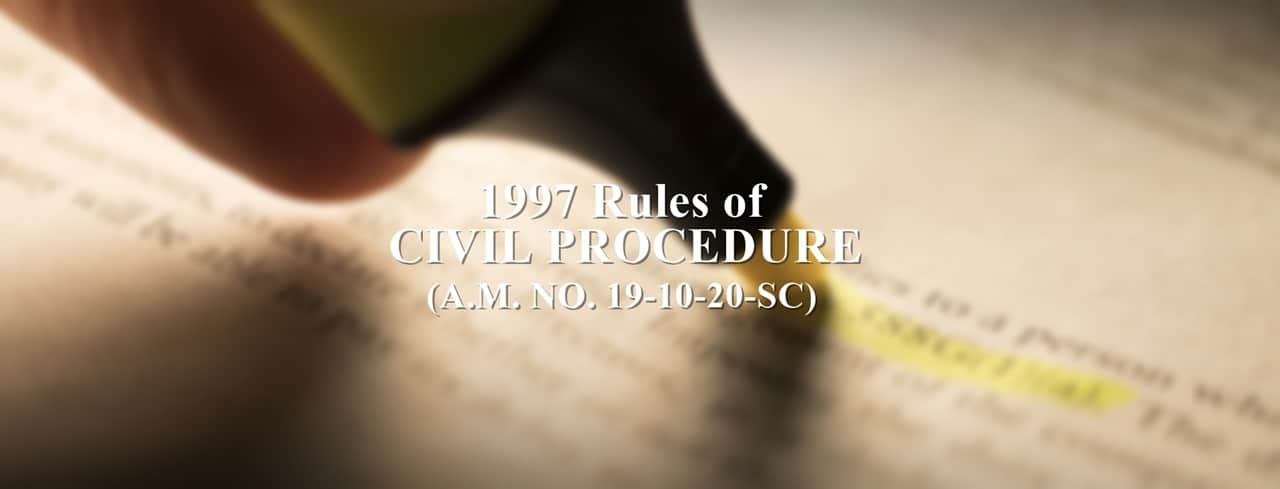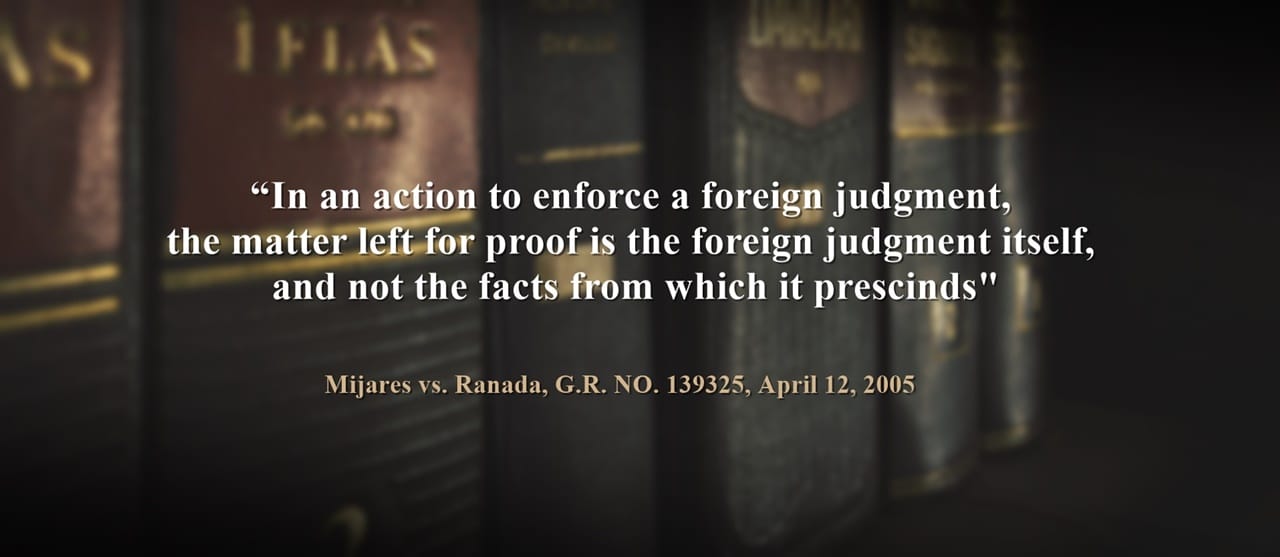


A Philippine court must examine the foreign judgment before it can be enforced.
Let’s say that a court in Europe or the United States renders a judgment for a sum of money against someone living in the Philippines or against an estate the Philippines. How can the foreign money judgment be enforced in the Philippines?

Filing in the wrong court may result in the dismissal of the case.
The foreign judgment can be enforced by a Philippine court. A case for its enforcement should be filed with the appropriate Regional Trial Court in the Philippines.
Doing so requires an understanding of the rules of procedure which govern enforcement of foreign judgment in the Philippines, its requirements, as well as the principles on which it is based.

The Philippines will recognize a foreign judgment not inconsistent with our laws.
The rules on foreign judgments are found in the Rules of Court promulgated by the Supreme Court of the Philippines. These Rules are broadly similar to those of the United States.
(As part of its colonial inheritance, our rules of civil procedure are broadly patterned after those of the state of California.)
The specific provision is in Section 48, Rule 39 of the Rules of Civil Procedure.
The foreign court judgment is itself the evidence of the right which can be enforced in the Philippines. Section 48 thus provides that a valid foreign judgment has the following effects:
(a) In case of a judgment or final order upon a specific thing, the judgment or final order, is conclusive upon the title to the thing, and
(b) In case of a judgment or final order against a person, the judgment or final order is presumptive evidence of a right as between the parties and their successors in interest by a subsequent title.
The foreign judgment is accorded respect by the Philippine legal system once proven as a fact.
This respect is given if certain conditions are met. Enforcement can be refused if the Philippine court finds that the foreign court lacked of jurisdiction, failed to give notice to the other party, or that there was collusion, fraud, or clear mistake of law or fact. A foreign judgment may also be barred from recognition if it runs counter to public policy.[i]
[i] Republic vs. Hon. Mupas, G.R. No. 181892, September 8, 2015.

The Supreme Court has acknowledged the importance of the recognition of foreign jugments.
Philippine courts can review whether there is ground to refuse recognition of the foreign judgment, but they exercise only limited review on the judgment’s content and the courts are not allowed to delve into its merits.[i]
A case for the recognition of a foreign judgment is not an occasion to relitigate what an earlier court has already ruled upon. It is not the place to retry the factual controversies. Rather, in recognition of foreign judgment cases, Philippine courts are limited to the question of whether or not to extend the effect of a foreign judgment in the Philippines.
This means that it will not be necessary to call the same witnesses and present the same evidence in order for the Philippine court to rule on the controversy already decided in the foreign court. Rather, the main issue is the existence and the validity of the foreign judgment.
The Supreme Court has made it clear that:
“[I]n an action to enforce a foreign judgment, the matter left for proof is the foreign judgment itself, and not the facts from which it prescinds.
If every judgment of a foreign court were reviewable on the merits, the plaintiff would be forced back on his/her original cause of action, rendering immaterial the previously concluded litigation.”[ii]

The Philippine justice system generally accepts the judgment from the foreign country if it is not illegal or immoral.
The Supreme Court has further ruled that:
“Philippine courts are incompetent to substitute their judgment on how a case was decided under foreign law. They cannot decide on the ‘family rights and duties, or on the status, condition and legal capacity’ of the foreign citizen who is a party to the foreign judgment. Thus, Philippine courts are limited to the question of whether to extend the effect of a foreign judgment in the Philippines.[iii]
Foreign judgments, subject only to few exceptions, are not open to re-examination on the merits when brought for enforcement before a Philippine court.
This rule on limited review embodies the policy of efficiency and the protection of party expectations, as well as respecting the jurisdiction of other states.[iv]
This principle seeks to accomplish a policy common to all countries: to give finality to litigation. The issues between the parties are supposed to be deemed resolved once one court has rendered final judgment.[v]
“Public policy dictates conserving judicial energy in deciding individual suits, encouraging confidence in and deference to court decrees, and securing the legitimate expectation of the successful plaintiff or defendant that he will no longer be harassed into protecting his interests.”[vi]
[i] Encarnacion vs. Johnson, G.R. No. 192285, July 11, 2018.
[ii] Mijares vs. Ranada, G.R. NO. 139325, April 12, 2005.
[iii] Fujiki vs. Marinay, G.R. No. 196049, June 26, 2013.
[iv] Fujiki v Marinay, 700 SCRA 69, 92 (2013), citing Mijares v Ranada, 455 SCRA at 411-412 (2005).
[v] CONFLICT OF LAWS: Cases, Materials and Comments, 2000 ed., Jorge R. Coquia & Elizabeth Aguiling-Pangalangan, pages 533 to 534.

Proof of the foreign judgment must be documented.
A foreign court judgment or order can be recognized and/or enforced after a conclusive and a final finding by the Philippine court that:
(1) the foreign court or tribunal has jurisdiction over the case,
(2) the parties were properly notified, and
(3) there was no collusion, fraud, or clear mistake of law or fact. [i]
The foreign judgment itself must first be proven. Its existence and authenticity must be proven as facts under Philippine rules on evidence.
This requirement presents special problems since it involves foreign documents. Proper authentication of foreign documents usually requires that they be obtained and properly apostilled in accordance with the international treaty known as the Hague Apostille Convention (HAC).
Because it concerns the interplay of both foreign and Philippine laws, this process of apostilling or authenticating the foreign judgment then offering it in evidence to the court can seem arcane. It inevitably requires guidance from counsel experienced in navigating these requirements.
However, once the foreign judgment is obtained, authenticated, and offered, certain presumptions may be invoked in order for the Philippine court to enforce it.
Once authenticated and proved, the foreign judgment will be presumed to be valid and binding in the country from which it comes. The regularity of the court proceedings and the giving of due notice will be presumed. Procedural matters relating to the foreign judgment, such as the serving of the decision on the defendant, are likewise presumed valid.[ii]
[i] Republic vs. Hon. Mupas, G.R. No. 181892, September 8, 2015.
[ii] Northwest Orient Airlines, Inc. vs. Court of Appeals and C.F. Sharp & Company, Inc., G.R. No. 112573 February 9, 1995.

Philippine courts can deny enforcement on limited grounds.
There are only limited grounds on which to deny enforcement of a duly proven foreign judgment.
Philippine courts will only determine (1) whether the foreign judgment is inconsistent with an overriding public policy in the Philippines; and (2) whether any alleging party is able to prove an extrinsic ground to repel the foreign judgment, i.e. want of jurisdiction, want of notice to the party, collusion, fraud, or clear mistake of law or fact.
If there is neither inconsistency with public policy nor adequate proof to repel the judgment, Philippine courts should, by default, recognize the foreign judgment as part of the comity of nations. [i]
[i] Fujiki vs. Marinay, G.R. No. 196049, June 26, 2013.

During the pandemic, the Supreme Court and DFA have discussed the use of video conferencing if the witness is abroad.
Yes. The case can be filed and go to trial even if the plaintiff is outside the Philippines. To do this, there are documents which will need to first be authenticated or apostilled abroad to render them admissible as evidence before the Philippine court. The petition or complaint will itself need to be notarized overseas, either at the Philippine consulate or before a foreign notary and then apostilled by the competent authority in that country.
The same goes for the affidavits of witnesses based abroad. These can then be sent to the Philippines to initiate the case in court.
The COVID pandemic has prompted the Supreme Court to issue rules expanding the use of remote, video conference court hearings among Philippine trial courts. One result of this is that witnesses appearing in court may testify remotely even without being in the same city or country as the court. Witnesses abroad may potentially testify even if they are outside the Philippines.

Court cases entail costs.
There are the typical legal fees as with any other court cases involving counsel. There are also the necessary foreign expenses since the documents must be secured from abroad, duly authenticated and apostilled, all of which must be coordinated with counsel in the Philippines.
In complaints for the enforcement of sum of money judgments, there are also court filing fees computed on the basis of the adjudged value. The tables for these computations are found in Rule 141 of the Rules of Court.
This article on Philippine recognition and enforcement of foreign court judgments is largely based on the law office’s experience in handling cases concerning the enforcement of foreign court judgments in the Philippines.
A Philippines Court has denied recognition of a UK child adoption, concluding that the adoption needs to be by both the adoptive parent and by the Filipino biological mother. Is this correct? Reply
FCB Law on January 28, 2023 at 4:45 pmWe would need more information about the facts of the case to say. We can’t comment without details about the specific situation. Reply
Connie on April 27, 2022 at 11:15 am How much you charge for recognition of foreign judgment and where this located Reply FCB Law on May 3, 2022 at 5:26 pmThis depends on the particular case and in which court it should be filed. We will be happy to discuss your concerns through our portal at https://lawyerphilippines.org Reply

Search by Practice Area

Search by Topic